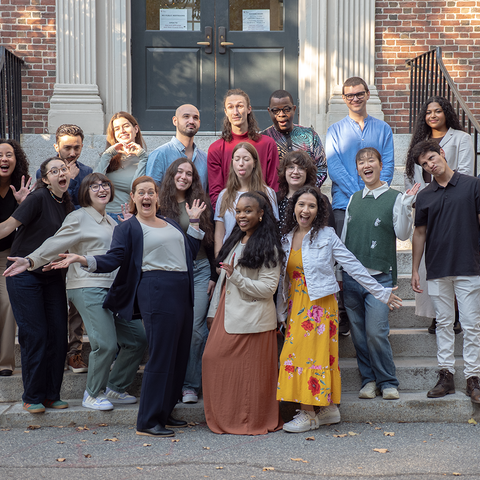To Serve Others and Be Well-Loved
Cultivating spiritual wellness during tumultuous times

A lot is happening in the world at the intersection of religion and politics, making it difficult to tune into feelings of blessedness, gratitude, joy, or inner peace. How do we maintain our spiritual wellness when suffering looms, both at home and abroad?
The Harvard Chaplains are here to help all members of the University community—religious, agnostic, and atheist—grapple with these questions. Described on their website as “A professional community of more than forty members, the chaplains represent many of the world’s religious, spiritual, and ethical traditions, and share a collective commitment to serving the spiritual needs of the students, faculty, postdoctoral researchers, and staff of Harvard University.”
After decades of working for social justice and peace, John Bach, Harvard’s Quaker chaplain, understands the challenge of the times we are living through. His words resonate deeply and drive home a valuable point: Despite our differences, there is common ground to be found when we listen and learn about each other’s lived experiences.
A Community of Equal Space—and Silence
For Bach, spiritual wellness is to serve others and be well-loved. (“What better epitaph to aim for?” he says.) From the family level to the local community to the world, this adage has guided Bach’s faith as well as his political activism. "Engage the whole world as if it depends on you,” he says.
From his roots as a Quaker, Bach also developed a deep appreciation for what can be gained when worshipping in silence. “Three of the freest years of my life I spent in prison, often in solitary confinement, during the civil rights movement and Vietnam War.” Quakers believe there is a bit of divine light in us all, also known as “the still small voice.” Worshipping without ministers, hymns, or invocations of any kind allows that voice to sing.
Moreover, in Bach's experience, something important is born from that community of equal space and silence. “Continuing revelation—when people of good will come together in common purpose, there will be a sense of spirit moving among them.” As Bach says, “When folks from different backgrounds stand together in a united effort, our different faiths are subsumed by a larger purpose.”
Everything Is Connected
“There is no difference between the spiritual self, emotional self, and political self,” Bach says. Indeed, the interconnectedness of the well-being framework is almost always at the core of our articles. For Bach too, there is little sense in separating these aspects of self, nor is there sense in focusing on what separates us from others or the world. “Everything is connected. We are all called in the defense of nature and life. A crime against one is a crime against all. When one of us is diminished or demeaned, we are all diminished.”
Similarly, ignoring our spiritual needs harms our overall well-being and may even prevent us from living a truly full life. Informed by the works of the Reverend Dr. Martin Luther King, Jr. and Mahatma Gandhi, Bach believes that “Spiritual wellness is living fully by finding something you are willing to die for . . . responding to the dictates of your conscience.” This is why it is so crucial, even for those of us who do not identify as religious or who may even take issue with religion as a whole, to tune into our sense of spirit and to identify how we will engage in the pursuit of truth, the act of loving, and self-sacrifice.
Witnesses to Each Other
A man full of wisdom, Bach was happy to share some of how he practices spiritual wellness and faith. Overall Bach encourages orientation toward life, love, and curiosity. “Because I go to a lot of standouts with folks who may be reliving history, I have learned not to debate, but to ask, ‘What in your background has led you to your opinions?’ And then I let them know I am willing to share.” In this way, Bach establishes common ground and creates the opportunity for open dialogue.
Related is the idea of “witnessing” others. Bach particularly notes children as “the great equalizers”—that his spirituality and faith were formed not by academic teachings or tomes, but by seeing images of suffering children during the Vietnam War. “That is what steels you to any consequences for conscientious action. We as a world must serve as witnesses to each other, and in this way, maintain our connectedness and humanity.”
Spirituality, faith, divine spark, gratitude, hope: There are many names to describe the lights that carry us through times of darkness. Whatever your light is, tend gently to it this month—and to the lights of those around you. And remember always to visit B-2 to be well.
Get the Latest Updates
Join Our Newsletter
Subscribe to Colloquy Podcast
Simplecast





